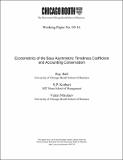Econometrics of the Basu Asymmetric Timeliness Coefficient and Accounting Conservatism
Author(s)
BALL, RAY; KOTHARI, S. P.; NIKOLAEV, VALERI V.; Kothari, S. P.
DownloadKothari_Econometrics of.pdf (948.0Kb)
OPEN_ACCESS_POLICY
Open Access Policy
Creative Commons Attribution-Noncommercial-Share Alike
Terms of use
Metadata
Show full item recordAbstract
A substantial literature investigates conditional conservatism, defined as asymmetric accounting recognition of economic shocks (“news”), and how it depends on various market, political, and institutional variables. Studies typically assume the Basu [1997] asymmetric timeliness coefficient (the incremental slope on negative returns in a piecewise-linear regression of accounting income on stock returns) is a valid conditional conservatism measure. We analyze the measure's validity, in the context of a model with accounting income incorporating different types of information with different lags, and with noise. We demonstrate that the asymmetric timeliness coefficient varies with firm characteristics affecting their information environments, such as the length of the firm's operating and investment cycles, and its degree of diversification. We particularly examine one characteristic, the extent to which “unbooked” information (such as revised expectations about rents and growth options) is independent of other information, and discuss the conditions under which a proxy for this characteristic is the market-to-book ratio. We also conclude that much criticism of the Basu regression misconstrues researchers’ objectives.
Date issued
2013-12Department
Sloan School of ManagementJournal
Journal of Accounting Research
Publisher
Wiley Blackwell
Citation
BALL, RAY, S. P. KOTHARI, and VALERI V. NIKOLAEV. “Econometrics of the Basu Asymmetric Timeliness Coefficient and Accounting Conservatism.” Journal of Accounting Research 51, no. 5 (December 2013): 1071–1097.
Version: Author's final manuscript
ISSN
00218456
1475-679X